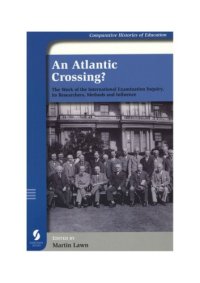
Ebook: An Atlantic Crossing? The Work of the International Examination Inquiry, its Researchers, Methods and Influence
Author: Martin Lawn
- Genre: Education // International Conferences and Symposiums
- Tags: history International Examination Inquiry (IEI) international education academic achievement tests international comparisons standardized testing Carnegie Corporation Baccalauréat Finnish Matriculation Examination national curriculums IQ tests Binet 1930s Cyril Burt Charles Spearman Godfrey Thomson Jean Piaget Edward Thorndike Germany Sweden Finland England USA Switzerland Scotland
- Series: Comparative Histories of Education
- Year: 2008
- Publisher: Symposium Books
- Language: English
- pdf
This book focuses on the International Examinations Inquiry (IEI), an international, well-funded scientific project that operated in the 1930s, attracting key world figures in educational research, and which undertook significant exchanges of data.
Originally involving the USA, Scotland, England, France, Germany and Switzerland, the IEI grew to include Norway, Sweden and Finland. Funded by Carnegie money, these researchers included major comparative educationalists, New Education Fellowship academics, statisticians and educational psychologists. They met at a significant time in the emergence of international scientific work in educational research between the USA and Europe; they were a midway stage between earlier individual contacts by well-travelled researchers, usually towards North America, and the development of joint research projects, sustained over time.
The focus of the IEI was on methods of examining pupils for the coming expansion of secondary education, but their key problems were to do with establishing standardized methods of measurement, international scholarly communication and comparative understandings of national diversity. The IEI researchers acted to support national achievements and strategies within the borders of the nation and internationally, to exchange methods and results. In retrospect, they appear to be visible in their knowledge communities and national education histories but invisible in their internationalism.
Originally involving the USA, Scotland, England, France, Germany and Switzerland, the IEI grew to include Norway, Sweden and Finland. Funded by Carnegie money, these researchers included major comparative educationalists, New Education Fellowship academics, statisticians and educational psychologists. They met at a significant time in the emergence of international scientific work in educational research between the USA and Europe; they were a midway stage between earlier individual contacts by well-travelled researchers, usually towards North America, and the development of joint research projects, sustained over time.
The focus of the IEI was on methods of examining pupils for the coming expansion of secondary education, but their key problems were to do with establishing standardized methods of measurement, international scholarly communication and comparative understandings of national diversity. The IEI researchers acted to support national achievements and strategies within the borders of the nation and internationally, to exchange methods and results. In retrospect, they appear to be visible in their knowledge communities and national education histories but invisible in their internationalism.
Download the book An Atlantic Crossing? The Work of the International Examination Inquiry, its Researchers, Methods and Influence for free or read online
Continue reading on any device:

Last viewed books
Related books
{related-news}
Comments (0)